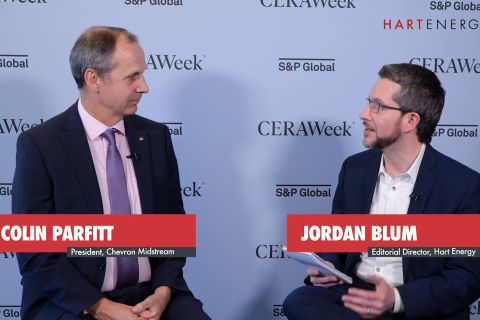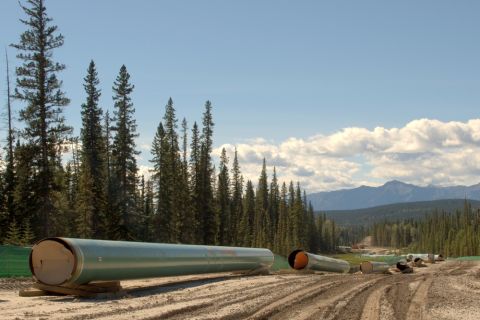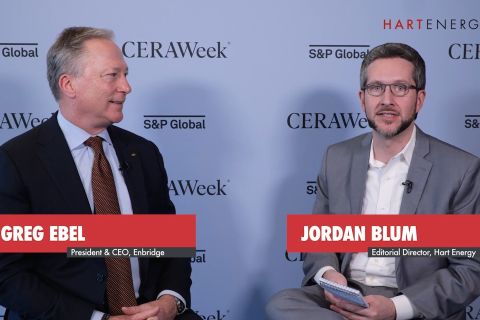Jordan Blum, editorial director, Hart Energy: We are here at NAPE in downtown Houston talking about AI in the oil field, machine learning and predictive analytics. I'm joined by Andrew Muñoz, the chief operating officer at 4Cast. So just to get into it, when you talk about AI, it's maybe a bit of an overused term. So can I get you to just kind of elaborate what we really mean when we say AI, but don't really necessarily mean AI?
Andrew Muñoz, COO, 4Cast: Right. Well, oil and gas is not unfamiliar with AI. We’ve used AI throughout almost a decade with the applications of machine learning. So machine learning as we know it now, or as we've used it, is trying to predict outcomes using numerical models and by encoding numbers and coming up with predictive outputs that way. And AI has been used at this kind of loose term, in and out, but in reality, we've been doing machine learning for many years all the way back since when I was in grad school or before. So the big change, the big thing that has switched is the advent of large language models that instead encode text and human language into these AI models.
JB: So how is that evolution changing things in the oil field?
AM: Yeah, so the biggest change I think is accessibility. So I mean, we've had access to machine learning models, and as it became open source, it became even more used in oil and gas. But with large language models being completely open and having the ability for companies and for individuals to program in them and use them, it has opened the floodgates for the ability for people to develop code to interact with and consolidate data and consolidate text. I think it's going to be huge for education and for development of companies and efficiencies.
JB: Very good. So can you elaborate a bit on just what 4Cast is working on and how that's applicable to the energy sector?
AM: Yeah. So 4Cast is an all-in-one acquisitions- divestiture-type tool where we can do evaluations and do full economic outputs for any type of oil and gas asset. So we provide the data through a partnership with Rextag, and they have a fantastic upstream dataset that we package with our software and give it to our clients to really quickly load up wells, do deals, or come up with economic outputs and have the ability to transact deals much faster than they would normally.
JB: Very good. So I know things are changing a lot, but you still have a lot of old school thought in the energy sector. Do you see that changing? Are companies afraid to adopt new technologies or how do you see that playing out?
AM: Yeah, that's unfortunately been a trend for a long time in oil gas. We've been slow to adopt. Some are very fast followers. We've seen examples of that here, companies showing off the machine learning workflows they've been doing for years and honing in. But the reality is oil and gas has and probably will be for the foreseeable future, be a lot of old school technology, a lot of old school applications. And there's some benefit to those because you get the experience to go along with it. But as AI and open source models become more accessible to the industry, we should be adopting them and following quickly in those footsteps, because the efficiencies gained from that will help continue to grow the industry and prevent it from falling into it being an obsolete commodity industry.
JB: Well, in that vein, how do you see things playing out over the next few years?
AM: I mean, I think LLMs training themselves are going to be the biggest change. So machine learning on machine learning, and the fact that we can encode language into it and have these models that can accelerate in the way that they are is going to be just dramatic in what the applications go to. Almost anything that you can think of is going to be touching AI in the world at this point, and oil and gas is going to be no different to that. Companies are going to be relying on it, they're going to be using it for all sorts of efficiencies, and I think jobs will be changed. I don't think jobs necessarily will be replaced, but people using AI, people using these models are going to be the ones who are most in demand in the future. So I think for young people, learn how to use them—these models, learn how to do a little bit of programming, a little bit of understanding of how these LLMS work, and figure out how to best incorporate into your workflows.
JB: Well, thank you so much for joining us here at NAPE. Really appreciate it. To read and watch more, please visit online at hartenergy.com.
Recommended Reading
Exclusive: Chevron Balancing Low Carbon Intensity, Global Oil, Gas Needs
2024-03-28 - Colin Parfitt, president of midstream at Chevron, discusses how the company continues to grow its traditional oil and gas business while focusing on growing its new energies production, in this Hart Energy Exclusive interview.
Imperial Expects TMX to Tighten Differentials, Raise Heavy Crude Prices
2024-02-06 - Imperial Oil expects the completion of the Trans Mountain Pipeline expansion to tighten WCS and WTI light and heavy oil differentials and boost its access to more lucrative markets in 2024.
Carlson: $17B Chesapeake, Southwestern Merger Leaves Midstream Hanging
2024-02-09 - East Daley Analytics expects the $17 billion Chesapeake and Southwestern merger to shift the risk and reward outlook for several midstream services providers.
Midstream Builds in a Bearish Market
2024-03-11 - Midstream companies are sticking to long term plans for an expanded customer base, despite low gas prices, high storage levels and an uncertain political LNG future.
Exclusive: Renewables Won't Promise Affordable Security without NatGas
2024-03-25 - Greg Ebel, president and CEO of midstream company Enbridge, says renewables needs backing from natural gas to create a "nice foundation" for affordable and sustainable industrial growth, in this Hart Energy Exclusive interview.





